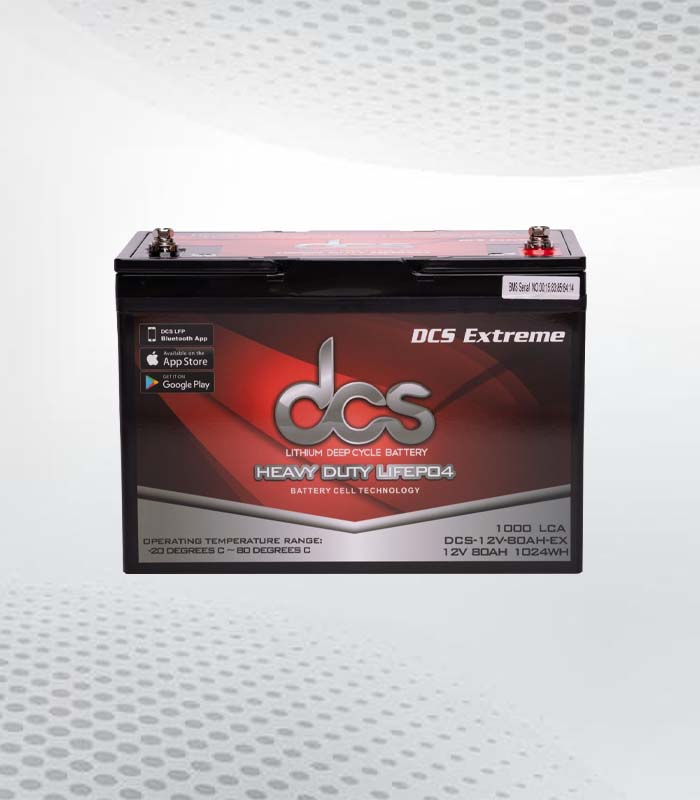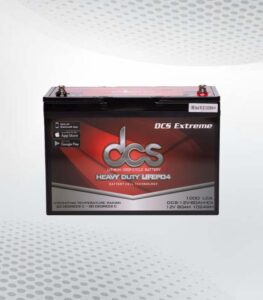When it comes to powering your truck, tractor, or automotive equipment, choosing the right battery pack is crucial. A reliable and efficient 12V DC battery pack can ensure that your vehicle starts smoothly every time and provides consistent power for all your electrical systems. In this article, we will explore the various aspects of 12V DC battery packs, from understanding different types to factors you should consider when making a choice.
Understanding the different types of 12V batteries
Before diving into the specifics of choosing a 12V DC battery pack, it’s important to familiarize yourself with the different types available. The most common types of 12V batteries include lead-acid, lithium-ion, and AGM (Absorbent Glass Mat) batteries.
Lead-acid batteries are the traditional choice and offer a cost-effective solution for many applications. They are robust, reliable, and can provide high starting currents. However, they require regular maintenance, including topping up the electrolyte levels, and have a limited lifespan compared to other options.
Lithium-ion batteries, on the other hand, are known for their high energy density and longer lifespan. They are lighter, have a higher charge acceptance rate, and require minimal maintenance. Although they are more expensive upfront, their longevity and performance make them a popular choice for many truck, tractor, and automotive owners.
AGM batteries are a type of lead-acid battery that utilizes a fiberglass mat to absorb and hold the electrolyte. They are maintenance-free and provide excellent deep-cycle capabilities. AGM batteries are commonly used in vehicles with high electrical demands, such as trucks and tractors.
Factors to consider when choosing a 12v Truck Battery
When selecting a 12v Truck Battery there are several factors that you should take into account. These factors will help you determine the right battery capacity, voltage, and technology for your specific needs.
Firstly, consider the power requirements of your vehicle. Different vehicles have different electrical demands, and it’s essential to choose a battery pack that can meet those demands without strain. Consider the starting power required, as well as the capacity needed for continuous operation.
Secondly, evaluate the available space for your battery installation. Depending on the size and type of your vehicle, you may have limited space for the battery. Ensure that the chosen battery pack fits comfortably within the allocated area without compromising safety or functionality.
The importance of 12 volt tractor battery capacity and voltage
12 volt tractor battery capacity and voltage are two critical specifications to consider when choosing a 12V DC battery pack. Battery capacity refers to the amount of energy the battery can store and deliver over a specific period. It is typically measured in ampere-hours (Ah) and determines how long your vehicle’s electrical systems can operate before the battery needs recharging.
To determine the appropriate battery capacity for your vehicle, consider the power requirements of your electrical systems and how long you typically operate them without the engine running. It’s always recommended to choose a battery with slightly higher capacity than you think you’ll need to account for unexpected power demands.
Voltage, on the other hand, is a measure of electrical potential difference. In the case of 12V DC battery packs, the voltage remains constant at 12 volts. It’s important to ensure that your vehicle’s electrical systems are compatible with this voltage. Using a battery with the wrong voltage can lead to system malfunctions and potential damage.
Comparing 12 volt automotive battery technologies for trucks
When it comes to trucks, tractors, and automotive applications, different battery technologies offer specific advantages. Let’s compare the three most common types: lead-acid, lithium-ion, and AGM batteries.
Lead-acid batteries have long been the go-to choice for trucks, tractors, and automotive vehicles. They are reliable, cost-effective, and readily available. Lead-acid batteries can deliver high starting currents required by these vehicles and have a long track record of performance. However, they require regular maintenance, including checking electrolyte levels and occasionally adding distilled water. They also have limited deep-cycle capabilities.
12 volt automotive battery is gaining popularity in the automotive industry due to their high energy density, longer lifespan, and low maintenance requirements. They are lighter, which can contribute to fuel efficiency, and can provide consistent power even in extreme temperatures. However, they come with a higher upfront cost, and their performance may vary depending on the specific brand and model.
AGM batteries, a type of lead-acid battery, offer the advantages of both lead-acid and lithium-ion technologies. They are maintenance-free, provide excellent deep-cycle capabilities, and are more resistant to shocks and vibrations. AGM batteries are commonly used in trucks and tractors due to their ability to handle high electrical demands and their durability in rugged environments.
Tips for maintaining and prolonging the lifespan of your 12V DC battery pack
To ensure optimal performance and longevity of your 12V DC battery pack, proper maintenance is essential. Here are some tips to help you maintain your battery and prolong its lifespan:
- Regularly inspect your battery for signs of corrosion, leakage, or physical damage. Clean the terminals and connectors to prevent poor electrical contact.
- Keep your battery clean and free from dirt, dust, and debris. These contaminants can affect the battery’s performance and potentially cause short circuits.
- Avoid deep discharges whenever possible. Deep discharges can reduce the battery’s overall capacity and lifespan. If your vehicle will be parked for an extended period, consider using a battery maintainer or disconnect the battery to prevent deep discharge.
- Monitor the electrolyte levels (for lead-acid batteries) and keep them within the recommended range. Topping up with distilled water may be necessary from time to time.
- Ensure that the battery is securely mounted and protected from excessive vibrations and shocks. Use appropriate fasteners and insulation to prevent damage.
Choosing the right 12V UPS battery for backup power supply
Uninterruptible Power Supply (UPS) systems provide backup power during electrical outages, allowing critical equipment to continue operating without interruption. Choosing the right 12V UPS battery is essential to ensure reliable backup power supply. Here are some key factors to consider when selecting a 12V UPS battery:
Battery capacity: Determine the power requirements of your critical equipment and choose a battery with sufficient capacity to support them during outages. Consider the runtime needed and any additional power demands during startup.
Recharge time: Look for batteries that have a relatively short recharge time. This ensures that the battery can quickly recover its charge and be ready for the next outage.
Cycle life: Consider the number of discharge and recharge cycles the battery can withstand. Batteries with a higher cycle life are more durable and can provide reliable backup power for a longer period.
Maintenance requirements: Depending on your preferences and available resources, choose a UPS battery that aligns with your maintenance capabilities. Some batteries require regular monitoring and topping up, while others are maintenance-free.
Compatibility: Ensure that the battery is compatible with your UPS system. Consult the manufacturer’s specifications and guidelines to select a battery that meets the required standards.
Selecting the ideal 12V inverter battery for off-grid power systems
Off-grid power systems rely on inverters to convert DC power from batteries into AC power for household appliances and electrical devices. Selecting the right 12V inverter battery is crucial to ensure efficient and reliable off-grid power supply. Here are some key considerations when choosing a 12V inverter battery:
Battery capacity
Determine the power requirements of your off-grid system, including the total wattage of the appliances and devices you intend to power. Choose a battery with sufficient capacity to meet these requirements and provide a comfortable margin for unexpected power demands.
Deep-cycle capability
Off-grid power systems often require frequent discharges and recharges. Look for batteries with deep-cycle capabilities, as they are designed to withstand these cycles without significant capacity loss or damage.
Compatibility
Ensure that the battery is compatible with your inverter system. Consider the voltage requirements and any specific recommendations provided by the inverter manufacturer.
Lifespan
Evaluate the expected lifespan of the battery. Lithium-ion batteries generally have longer lifespans compared to lead-acid batteries, but they may come at a higher cost. Consider your long-term plans for your off-grid system and choose a battery that aligns with your needs.
Environmental considerations
If your off-grid system is located in an area with extreme temperatures or high humidity, choose a battery that can withstand these conditions without compromising performance or lifespan.
 FAQs
FAQs
Q: Can I use a 12V automotive battery for my truck or tractor?
A: While 12V automotive batteries may have similar voltage ratings, they may not be suitable for heavy-duty applications such as trucks and tractors. These vehicles often require batteries with higher cranking power and durability to withstand the demanding conditions they operate in. It’s best to choose batteries specifically designed for trucks and tractors to ensure optimal performance and longevity.
Q: How often should I check and maintain my 12V battery?
A: Regular battery maintenance is crucial for optimal performance and longevity. It’s recommended to visually inspect your battery every three months for signs of corrosion, leakage, or physical damage. Additionally, check the electrolyte levels (for lead-acid batteries) regularly and top up with distilled water as needed. Keep the battery clean and free from dirt or debris, and ensure it is securely mounted to prevent excessive vibrations.
Q: Can I use a 12V UPS battery for other applications?
A: 12V UPS batteries are specifically designed for backup power supply in case of electrical outages. While they can provide DC power, they may not be suitable for applications that require continuous and high-power output. It’s best to choose batteries specifically designed for the intended application to ensure optimal performance and safety.
Conclusion
Choosing the right 12V DC battery pack for your truck, tractor, or automotive needs is crucial for reliable performance and longevity. By understanding the different types of batteries, considering factors such as battery capacity and voltage, and evaluating specific battery technologies for trucks, tractors, and automotive applications, you can make an informed decision. Additionally, following proper maintenance tips and selecting the best 12V batteries for tractors, UPS systems, and off-grid power systems will ensure optimal performance and reliability. Take the time to choose the right battery pack, and you’ll enjoy efficient and worry-free power for your vehicle or equipment.
This Article Was First Published On:
Breaking Down The Benefits: Why A Lithium Battery Motorhome Is Key To Your Next Adventure?



